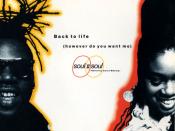Religion has been the most consistent, powerful, driving force in the history of human interaction. Religion dictates what people do, when they do it, where theyÃÂre going and how they get there with such a potent strength that millions upon millions of individuals have died and killed for what they believe in. Why would someone, anyone sacrifice their life or someone elseÃÂs for a faith that is by no means guaranteed? The answer, in simple terms, is that most and one could say nearly all people of the world believe that they have a soul. That is to say that there is an internal spirit that is divinely present that will last eternally once the body/brain is dead.
The soul has been believed to be what make an individual, an individual. The soul separates us, the humans, from the rest of the worldÃÂs creatures. There are even some religions that believe that all living things have souls.
The soul is true nature of a person; the essence of self each individual has; the consciousness that one feels. Without a soul a human is no more then a robot or computer responding to data that is fed into it by sense receptors. The soul is what carries over to the next world when oneÃÂs life on Earth has pasted and what one does in this life will forever be recognized by their god. Living a ÃÂgoodÃÂ or ÃÂproperÃÂ or ÃÂfaithfulÃÂ life will reward the soul with an eternity of wonder, while living a ÃÂbadÃÂ or ÃÂsinfulÃÂ life will result in eternal damnation for the soul (with variations depending on what religion one follows). Having a soul makes life meaningful beyond the pursuit of pleasure and the avoidance of pain. The soul solves the problem of nonexistence. The problem of nonexistence is the difficulty people have when they imagine what it would be like to be dead. Not dead with a soul, but complete eradication of self. That is, a world in which what ever I am does not exist.
Even for those individuals who donÃÂt have the strong religious beliefs that others may have, the soul is commonly characterized as the feeling of self. The emotions, beliefs, fears and memories one has are believed to be in or held by the soul. For individuals fitting this description the words soul and mind may as well be interchangeable. The mind, the thinking entity that tells us we should eat or that we are tired is truly all that the soul is.
The argument against the existence of souls can come from a number of angles. First, (assuming that there are souls) one may ask the question of whether the soul is eternal. That is, can the soul be destroyed, even by god? If one believes that god is the creator of all things and that god is omnipotent, which is the common belief of most gods, then it would be congruent to believe that god could destroy the souls which he created. However, it would seem that this would lead to the problem that drives many people to believe in a religion in the first place. That problem being, the problem of nonexistence. The same questions could be asked of the soul in heaven or hell (or where ever they go) that are asked of the body here on Earth. Is there something to the soul that goes beyond salvation or damnation and if so what is it? (This would be to essentially ask if a soul has a soul.) If there is then the same questions could be asked of these next plateaus that were asked of the previous and so on and so forth until all one is left with is an infinite regress.
So what is the essence, the spirit, the thinking, cognitive, emotional presents that is believed to be the soul? It is the brain, pure and simple. There is no soul, no mind, no spirit, just a brain with chemical reactions. The brain and its nervous system contain and are responsible for all functions, emotions and feelings of ÃÂthe soulÃÂ. Without a brain an object is unable to think. Without a functional nervous system an object is unable to react. There has been years of compelling scientific research showing the connection and necessity that the brain has to the mind. When one experiences brain damage and losses past memories (memories that are thought to be retained by the soul) it is not ever considered that the soul was damaged. When an individual experiences the feeling of pain, say from getting tackled by a 350-lb. defensive tackle, it can be traced to the brain as the result of firing C-fibers. Again, it is never believe that the soul was hurt when one an individual got crushed by a fat lineman, but if the soul doesnÃÂt get hurt in this way, how does it? Even if one were to argue that the soul only ÃÂfeelsÃÂ or ÃÂgets hurtÃÂ through emotions, like love, happiness, or fear, opponents can still look to the brain for answers. The emotion of happiness has been traced to chemical reactions in the brain where high levels of serotonin were present [1]. Everything that is accredited to the soul can be traced back to the brain.
There are obvious reasons why individuals have long held their beliefs in souls, spirits and goods. Without these beliefs it would seem that there would be no moral codes or ethical principles to follow in order to maintain and perpetuate the existence of life. There would be no purpose to life if there were no subsequent existence. Also, to say that those who believed in souls were at fault for their misconceptions would be an unjust proposition. The technological advances of the last twenty years have spurred the understanding of the brain and its connection with what was thought to be the soul exponentially.
Going back to the belief that without souls there would be no purpose to life, thus making it meaningless, one can find an error. Just because there is no purpose to life doesnÃÂt mean there is no purpose in life. If this life is all that there is, no heaven or hell, no eternity, then everything that is done in this life is of the ultimate importance and meaning. Do what makes your brain feel good and avoid what makes your brain feel bad. You can believe in god and the afterlife or you can believe that the 49ers are going to win the Super Bowl, if it makes the brain feel good thatÃÂs all that matters. ThatÃÂs life, live it well.
Works CitedWhy Chocolate Feels Good. Science and Nature: Hot Topics. March 2, 2007http://www.bbc.co.uk/science/hottopics/chocolate/addictive2.shtmlMcCormick, Matt. Against the Immortality of the Soul. 2006.





